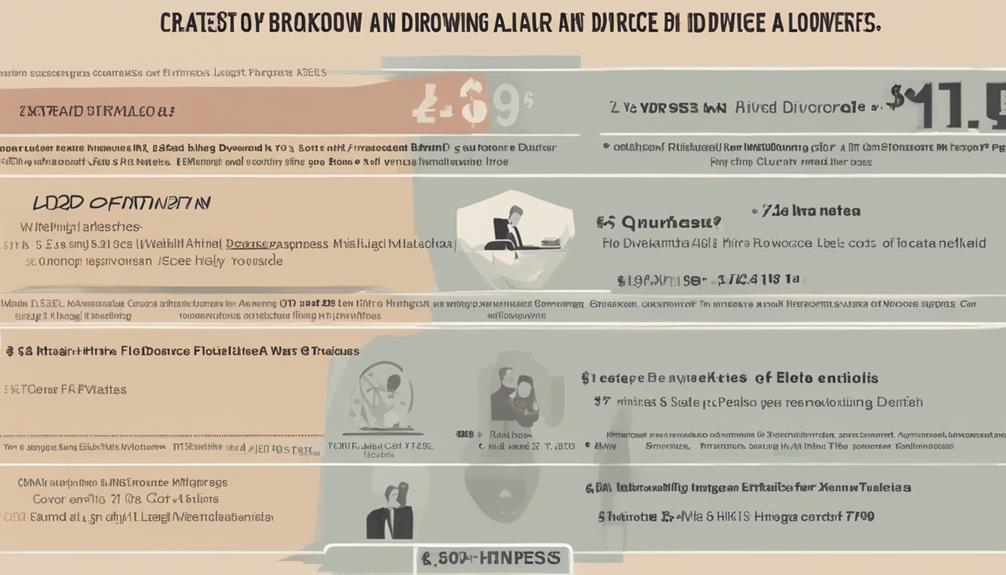Navigating the Divorce Process
Navigating When Your Spouse Files Divorce First

Were you aware that the act of one spouse initiating a divorce filing can profoundly influence the entire procedure? It extends beyond simply starting the legal action; it also establishes a framework for numerous strategic benefits during the course of the divorce.
Whether you find yourself in this situation or want to be prepared for the possibility, understanding how to navigate divorce when your spouse files first is crucial. In this article, we will delve into the benefits, considerations, and potential drawbacks of filing for divorce first. By gaining insights into this process, you can make informed decisions and ensure the best possible outcome for yourself.
Key Takeaways:
- Filing for divorce first grants strategic advantages in terms of control, timing, and preparation.
- Choosing the right divorce attorney early on can significantly impact the outcome of your case.
- Consider the potential consequences of revealing your strategy and desired outcomes to your spouse.
- Starting the divorce process sets the timeline and allows for the implementation of immediate solutions.
- Preventing asset movement and choosing the court location can work to your advantage.
Benefits of Filing for Divorce First
Filing for divorce first can provide numerous advantages and strategic benefits for individuals seeking to navigate the divorce process. By being proactive and initiating the divorce proceedings, the filing party gains an advantageous position that can significantly impact the outcome of the divorce. Here are some key benefits:
1. Choice of Divorce Attorney
When you file for divorce first, you have the opportunity to choose a divorce attorney of your preference before your spouse does. This allows you to carefully select legal representation that aligns with your goals and interests, ensuring that your case is in capable hands.
2. Early Access to Support
By taking the initiative to file for divorce, you gain early access to additional support services that can aid you throughout the process. This can include therapists or financial planners who can provide guidance and help you navigate the emotional and financial aspects of the divorce.
3. Securing Documentation and Financial Position
One significant benefit of filing for divorce first is the ability to gather all the necessary documentation and securely position yourself financially. This includes collecting financial records, property titles, and other relevant documents, ensuring that you have a comprehensive understanding of your financial situation. Securing a favorable financial position early on can have a significant impact on property division and other financial aspects of the divorce.
4. Preventing Strategic Asset Movement
By filing for divorce first, you can prevent your spouse from strategically moving or hiding assets, ensuring that all marital assets are accounted for during the division process. This helps maintain fairness and transparency in the distribution of assets and prevents any unfair advantage gained by your spouse through asset manipulation.
5. Home Court Advantage
When you file for divorce first, you have the ability to choose the court location. This can provide a significant advantage by reducing travel-related burdens and ensuring convenience during court appearances and proceedings. Choosing a court location closer to your residence can help minimize disruptions to work, childcare, and daily routines.
Overall, filing for divorce first offers several benefits that can positively influence the divorce process. From securing the right legal representation to gaining control over the court location and preventing asset movement, taking the first step can provide you with a more favorable position throughout the proceedings.
| Benefits of Filing for Divorce First |
|---|
| Choice of Divorce Attorney |
| Early Access to Support |
| Securing Documentation and Financial Position |
| Preventing Strategic Asset Movement |
| Home Court Advantage |
Considerations When Filing for Divorce First
While there are benefits to filing for divorce first, it is crucial to consider several factors before taking this step. This section explores key considerations that individuals should keep in mind when contemplating being the first to file for divorce.
1. Revealing Strategy and Desired Outcomes
Filing for divorce first means revealing your strategy and desired outcomes to your spouse. This disclosure may escalate tensions and give your spouse time to prepare a counter-argument. It is essential to carefully assess the potential consequences of disclosing your intentions ahead of time.
2. Financial Implications
Filing for divorce first incurs additional expenses, such as filing fees and process servers. These costs can significantly impact your financial situation. It is crucial to carefully evaluate your financial capabilities and determine if filing first is financially feasible.
3. Impact on Children
When considering filing for divorce first, one must prioritize the well-being of any children involved. Initiating the divorce process can potentially disrupt the lives of children and affect their emotional well-being. It is important to consider the impact filing first may have on them and make decisions in their best interests.
“Filing for divorce first can provide certain advantages, but it is essential to weigh those benefits against the potential consequences and the overall impact on yourself, your spouse, and any children involved.” – Divorce Attorney Michelle Johnson
4. Emotional Preparedness
Filing for divorce first can be an emotionally challenging process. It is important to assess your emotional preparedness and resilience before initiating the divorce process. Seeking support from therapists or counselors can be helpful in navigating the emotional aspects of divorce.
| Factors to Consider | Considerations |
|---|---|
| Revealing strategy and desired outcomes | Potential escalation of tensions, time for spouse to prepare counter-argument |
| Financial implications | Additional expenses such as filing fees and process servers |
| Impact on children | Prioritizing children’s well-being and assessing potential disruption |
| Emotional preparedness | Evaluating personal resilience and seeking emotional support |
Considering these factors is crucial before making the decision to file for divorce first. It is important to approach the process with comprehensive knowledge, emotional preparedness, and a clear understanding of the potential consequences.

The Advantage of Starting the Clock
When it comes to initiating the divorce process, there are significant advantages to being the one to start the clock. Filing for divorce first not only sets the timeline for court proceedings but also provides the filing party with greater control over the outcome of the divorce.
By taking the first step, the filing party ensures that the spouse will comply with dates and timelines set by the court. This control can be instrumental in shaping the direction of the divorce proceedings and achieving a favorable resolution.
One of the key benefits of starting the clock is the ability to implement immediate solutions through temporary or emergency orders. These orders can address pressing issues such as child custody, child support, and spousal support, providing stability and protection for both parties during the divorce process.
“Filing for divorce first allows the filing party to take control of the situation and set the tone for the proceedings. It ensures that their concerns and desired outcomes are heard and considered from the very beginning.”
When the filing party initiates the divorce process, they gain leverage and can negotiate from a stronger position. This advantage can be critical in securing favorable terms for child custody, property division, and financial arrangements.

By filing for divorce first, the filing party can set a proactive tone for the case. This means their concerns and reasons for divorce are presented on record before the spouse has a chance to respond. This initial presentation can shape the judge’s perception of the situation, potentially influencing the court’s decisions throughout the proceedings.
Advantages of Starting the Clock:
- Control over the timeline and court proceedings
- Ability to implement immediate solutions through temporary or emergency orders
- Negotiating from a position of strength
- Setting the tone and influencing the court’s perception
While filing for divorce first comes with advantages, it’s also essential to consider the potential drawbacks and the impact it may have on the relationship with the spouse. However, in most cases, the benefits of taking the initiative far outweigh the disadvantages, leading to a more favorable outcome in the divorce process.
The Power of Setting the Tone
When filing for divorce, being the first to initiate the process can have a significant impact on the tone of the case and the overall proceedings. It provides the opportunity to state the reasons for divorce on record, influencing the judge’s perception of the situation.
Setting the tone allows the filing party to establish the grounds for divorce, whether it is through irreconcilable differences or fault-based reasons. By presenting a clear and compelling case, the filing party can shape the narrative surrounding the divorce, potentially holding the spouse accountable for their actions throughout the process.
“Filing for divorce first provides the unique advantage of framing the narrative in your favor. By presenting your case as the petitioner, you set the stage for negotiations and influence the overall outcome of the divorce.”
During negotiations, setting the tone can impact the willingness of both parties to reach agreements. When the filing party takes charge and clearly communicates their intentions, it sets a precedent for respectful and productive discussions. This proactive approach can lead to more amicable resolutions and a smoother divorce process overall.
Furthermore, by establishing the tone early on, the filing party can highlight the spouse’s actions or behaviors that may have contributed to the breakdown of the marriage. This can influence the judge’s perception and decisions regarding matters such as asset division, child custody, and alimony.
Illustrative Example:
To illustrate the impact of setting the tone in a divorce case, consider a situation where one spouse files first and highlights the other spouse’s consistent financial irresponsibility. By presenting concrete evidence of the spouse’s excessive spending, mounting debt, and failure to contribute to household expenses, the filing party can position themselves as the responsible and diligent party seeking a fair resolution.
The ability to set the tone can influence the judge’s perception of each party’s character and behavior, potentially resulting in a more favorable outcome for the filing party in terms of financial settlements and custody agreements.
Early Implementation of Changes
Filing for divorce first provides significant advantages, including the ability to implement immediate changes and request temporary or emergency orders. This early implementation offers immediate solutions to pressing issues such as custody arrangements, child support, and alimony. By filing first, the filing party gains the advantage of securing necessary arrangements and protections early on, ensuring a stable transition during the divorce process.
When a divorce is initiated, there are often critical decisions that need to be made promptly. These decisions can greatly impact the well-being of both the filing party and any children involved. Filing for divorce first allows the filing party to take proactive steps in addressing these pressing matters without delay.
“By filing first, I was able to secure temporary custody of our children and ensure their well-being during the process. It provided stability and reassurance during a challenging time.” – Sarah Thompson, a divorced parent
One of the key advantages of implementing changes early on is the opportunity to establish order and structure within the family dynamic. This can alleviate confusion and potential conflicts by setting clear expectations and guidelines from the start.
Immediate Solutions for Stability
Addressing pressing issues promptly can offer a sense of stability during the divorce process. By filing for divorce first, the filing party can request temporary or emergency orders to address matters like:
- Custody arrangements: Filing first allows the filing party to present a proposed custody schedule, ensuring the best interests of the children are prioritized.
- Child support: Immediate requests for child support can be made, ensuring there is financial support in place for the children’s well-being.
- Alimony: Filing first provides an opportunity to request temporary spousal support, assisting with financial stability during the divorce proceedings.
Implementing these changes early on can help create a sense of security and ensure that the necessary arrangements are in place while the divorce process unfolds.

As shown above, when filing for divorce first, the filing party gains the advantage of implementing immediate changes and securing necessary arrangements. This early action establishes stability and addresses critical issues related to custody, child support, and alimony. By taking proactive measures from the onset, the filing party can navigate the divorce process with greater confidence and ensure a smoother transition for all parties involved.
Preventing Strategic Asset Movement
One of the significant advantages of filing for divorce first is the ability to prevent strategic asset movement during the divorce process. When a spouse files for divorce, it triggers a Joint Preliminary Injunction that restricts both parties from making major moves regarding assets outside of living expenses.
This prevents assets from being hidden, sold, or transferred with the intent to protect them from division. By filing for divorce first, the assets can be secured and safeguarded, ensuring fairness and transparency in the asset division process.
The Joint Preliminary Injunction serves as a critical legal mechanism to protect your assets and prevent your spouse from taking advantage of the time before the divorce process officially begins.

Protecting Assets During Divorce
| Asset Protection Strategies | Explanation |
|---|---|
| Full Disclosure of Assets | Provide accurate and comprehensive information about all assets during the divorce proceedings, ensuring transparency and fairness. |
| Temporary Restraining Orders | Obtain a court order to prevent the liquidation, transfer, or alteration of assets until a final determination is made. |
| Working with a Financial Advisor | Consult with a financial advisor to evaluate the potential impact of asset division and develop a strategy to protect your financial interests. |
| Utilizing Professional Valuations | Obtain independent valuations of complex assets, such as businesses or real estate, to ensure their accurate division. |
By implementing these strategies and taking advantage of the legal protections provided by filing for divorce first, you can safeguard your assets and minimize the risk of strategic movement that may compromise your financial future.
Home Court Advantage
Filing for divorce first not only provides strategic benefits in terms of timing and control but also allows for the choice of court location, offering convenience and reducing travel-related burdens. This advantage becomes particularly significant when spouses reside in different counties or locations, eliminating the need for the filing party to travel extensively for court appearances.
By filing first, the burden of navigating court proceedings is shifted to the spouse, minimizing disruptions to work, childcare responsibilities, and daily routines. This ensures that the filing party can attend court hearings and other proceedings more conveniently, without compromising other important aspects of their life.
By choosing the court location, the filing party gains the advantage of a more accessible and familiar setting. Familiarity with the court location can help the filing party feel more at ease during the divorce process, as they are already acquainted with the court’s procedures and personnel.
| Benefits of Home Court Advantage | Drawbacks of Home Court Advantage |
|---|---|
|
|
Overall, the ability to choose the court location when filing for divorce first not only provides convenience and reduces travel-related burdens but also allows for a more favorable and familiar setting. With reduced disruptions to work, childcare, and daily routines, the filing party can navigate the divorce process more effectively while ensuring their interests are adequately represented.
Speaking First in Court
Filing for divorce first can provide significant advantages when it comes to presenting your case in court as the petitioner. By being the first to speak, you have the opportunity to shape the narrative and highlight your side of the story. This can greatly influence the judge’s perception and decisions throughout the divorce trial.
Presenting your case as the petitioner allows you to state your desired outcomes before the respondent has a chance to present their arguments. This gives you a strategic advantage by setting the tone and establishing your priorities from the beginning.
“Being the petitioner puts you in control of the narrative, giving you the opportunity to frame the issues and present your evidence first. This first impression can have a lasting impact on the court’s perception of the case.”
The advantage of speaking first extends beyond being able to state your desired outcomes. It provides a larger window of time to present evidence, make persuasive arguments, and build a strong case. By presenting your case early on, you have the opportunity to influence the judge’s perception and potentially shape the direction of the trial in your favor.
Speaking first in court also allows you to address any potential counter-arguments raised by the respondent. By presenting your case before the other party, you can anticipate their arguments and prepare a convincing response that strengthens your position.
Ultimately, being the first to speak in a divorce trial as the petitioner gives you the opportunity to present your case effectively, influence the judge’s perception, and present a compelling narrative. It is a strategic advantage that can greatly impact the outcome of the divorce proceedings.

| Advantages of Speaking First in Court: |
|---|
| You set the tone and establish your desired outcomes |
| You have a larger window to present evidence |
| You can address potential counter-arguments |
| You have the opportunity to influence the judge’s perception |
Disadvantages of Filing for Divorce First
While there are several advantages to filing for divorce first, it is important to consider the potential drawbacks as well. Understanding these disadvantages can help you make an informed decision about initiating the divorce process.
Escalating Tensions and Revealing Strategy
Filing for divorce first may escalate tensions between you and your spouse. It can give away your strategy and desired outcomes, allowing the other party to prepare a counter-argument. This heightened conflict can make the divorce process more challenging and emotional.
Additional Expenses
Initiating the divorce process as the filing party incurs additional expenses in the form of filing fees and process servers. These costs can add up and impact your overall financial situation. It is important to consider the financial implications before deciding to file for divorce first.
“Filing for divorce first may escalate tensions between you and your spouse. It can give away your strategy and desired outcomes, allowing the other party to prepare a counter-argument.”
However, it is crucial to note that these disadvantages should not deter you from filing for divorce first if it aligns with your goals and circumstances. In many cases, the advantages of filing first outweigh the drawbacks, leading to a more favorable outcome in the divorce process.
| Disadvantages of Filing for Divorce First | Primary Impact |
|---|---|
| Escalating Tensions and Revealing Strategy | Potential for heightened conflict and strategic disadvantage |
| Additional Expenses | Incurring filing fees and process server costs |
Conclusion
Filing for divorce first can provide significant strategic advantages when navigating the divorce process. By taking the initiative, individuals gain control over important elements such as the timeline, choice of attorney, and the ability to set the tone for the proceedings. Early implementation of changes, including temporary or emergency orders, ensures immediate solutions to crucial issues like custody, child support, and alimony.
One of the key benefits of filing for divorce first is the prevention of strategic asset movement. By activating a Joint Preliminary Injunction, individuals can safeguard their assets from being hidden, sold, or transferred with the intent to protect them from division. Additionally, choosing the court location provides convenience and minimizes disruptions, particularly when spouses reside in different counties or locations.
While there are considerations and potential drawbacks such as revealing one’s strategy and incurring additional expenses, the advantages of filing for divorce first generally outweigh the disadvantages. It can significantly impact the outcome of the divorce, providing a better position for negotiations and a smoother overall process. By understanding the benefits and effectively navigating the divorce process, individuals can better protect their rights and secure a favorable resolution.
No, filing for divorce first does not inherently give any rights over your spouse. However, it allows for more control and strategic benefits in the process.
Filing first enables the choice of county and timing, provides opportunities for strategic planning and preparation, and allows for the selection of preferred legal representation.
Yes, it’s essential to consider factors such as revealing your strategy to the spouse, potential tensions, additional expenses, and the impact on children.
Filing first initiates the process and sets the timeline for court proceedings, ensuring compliance with dates and timelines and providing more control over the outcome of the divorce. Filing first allows the opportunity to state the reasons for divorce on record and influence the tone of the case. It can establish grounds for divorce and potentially hold the spouse accountable for their actions.
Filing first enables the implementation of immediate changes and the request for temporary or emergency orders, addressing pressing issues such as custody, child support, and alimony.
Filing first activates a Joint Preliminary Injunction, preventing either spouse from making major moves regarding assets outside of living expenses and protecting assets from division.
Yes, filing first allows the choice of court location, providing convenience and reducing travel-related burdens when spouses are residing in different counties or locations.
Filing for divorce first grants the opportunity to present the case as the petitioner and speak first in court, allowing the petitioner to present their side of the story and state their desired outcomes. Yes, filing first may escalate tensions with the spouse, reveal your strategy, and incur additional expenses for filing fees and process servers.
In most cases, the benefits of filing first outweigh the disadvantages, leading to a more favorable outcome in the divorce process.
FAQ
Does filing for divorce first give me any rights over my spouse?
What are the benefits of filing for divorce first?
Are there any considerations when filing for divorce first?
What advantage does starting the clock have in the divorce process?
How does filing for divorce first impact the tone of the case?
What is the advantage of early implementation of changes in a divorce?
How does filing for divorce first prevent strategic asset movement?
Can I choose the court location by filing for divorce first?
What advantage does speaking first in court provide?
Are there any disadvantages of filing for divorce first?
Do the benefits outweigh the disadvantages of filing for divorce first?
Source Links
- https://mensrightsdivorcelaw.com/blog/does-it-matter-who-files-divorce-first/
- https://divorce.com/blog/does-it-matter-who-files-for-divorce-first/
- https://buncherlaw.com/two-advantages-and-two-misconceptions-about-filing-first-for-divorce/
Sarah’s voice is one of the first you’ll encounter at How Get Divorce, and it’s one you’ll come to trust. As a writer, she brings relatability and approachability to complex topics, making them understandable for everyone. As our Community Moderator, Sarah fosters a welcoming and supportive environment, encouraging open dialogue and connection among our members. Her ability to relate to others and moderate discussions makes her an integral part of our team and community.
Navigating the Divorce Process
How to Get Your Attorney Fees Paid in a Divorce
In navigating divorce, understanding how to secure payment for attorney fees is crucial, but what happens if you miss a critical step?

Navigating through the intricacies of divorce, making sure you have your legal fees covered is an essential component of the process. For example, in some areas, like Texas, it’s crucial to incorporate a formal plea for the payment of fees in your initial divorce filing.
But what happens if this step is overlooked or not done correctly? Understanding the underlying principles and legal strategies that influence the payment of attorney fees in a divorce can significantly impact the outcome of your case.
Let's explore the nuances of getting your attorney fees paid in a divorce and the strategic approaches that can help secure financial assistance for legal representation.
Key Takeaways
- Request interim attorney fees based on financial need during divorce.
- Judges can order fee payments from community assets or spouse's income.
- Discuss financial situation openly to negotiate fair attorney fee payment.
- Consider alternative payment sources like selling assets or incurring debt.
Legal Options for Attorney Fees
When facing the financial burden of attorney fees in a divorce, understanding the legal options available is crucial for securing fair representation. In a community property state like Texas, spouses may be entitled to have their attorney fees paid from community assets.
Interim attorney fees can also be requested during the divorce proceedings to ensure both parties have access to legal representation. It's essential to seek legal assistance to navigate the complexities of these financial matters.
Judges have the authority to order payment of attorney fees based on the ability to pay from community assets. They carefully assess the reasonableness of the fees requested and may order payment from various sources. Methods to pay one's spouse's attorney fees can include making periodic payments from income, selling nonliquid property, or even incurring debt if necessary.
Ensuring that attorney fees are addressed promptly and fairly is crucial, especially in cases involving child custody where legal representation is vital for protecting one's rights.
Factors Influencing Fee Payment

Considering the financial dynamics at play in a divorce, various factors come into play when determining the payment of attorney fees, with the court weighing the financial standing of both parties as a critical influencer in the decision-making process. In Texas, attorney fees are considered community property until the divorce is finalized. Interim fees can be requested during the ongoing divorce process based on financial need. It's crucial to note that bad faith actions like hiding assets or non-compliance with court orders can lead to one spouse being responsible for paying the other's attorney fees. Additionally, judges may order one spouse to pay the other's fees to ensure equal access to legal representation. Fairness and equal representation are significant considerations for the court when making payment determinations regarding attorney fees in a divorce. Below is a table summarizing the key factors influencing fee payment:
| Factors | Influence on Fee Payment |
|---|---|
| Financial Status | Critical consideration |
| Bad Faith Actions | Responsibility for fees |
| Interim Fees | Based on financial need |
| Equal Representation | Ensuring fairness |
| Court Orders | Compliance importance |
Financial Considerations and Strategies
Understanding the financial implications and implementing effective strategies play a crucial role in navigating the payment of attorney fees during a divorce. It's important for both spouses to consider the financial status of each party when requesting payment of attorney fees.
In the legal realm, judges have the authority to order one spouse to pay the other's attorney fees based on just and right division principles. Temporary fees can be sought through a Motion for Interim Attorney Fees to cover ongoing legal costs. Spouses may need to provide justification for the reasonableness of the fees requested by their attorneys.
Exploring alternative payment sources, such as selling nonliquid assets or incurring debt, can be viable strategies to cover attorney fees during the divorce process. By being mindful of the financial aspects and leveraging available legal options, both parties can work towards a fair resolution in the payment of attorney fees.
State-Specific Laws and Resources

Navigating the intricacies of divorce laws and available resources in your state can significantly impact the outcome of attorney fee payments. In Texas, understanding the state-specific laws related to attorney fees is crucial for a successful divorce process. Here are some key points to consider:
- Attorney fees: In Texas, attorney fees can be requested in the original petition for divorce.
- Financial status: Texas courts take into account the financial status of both parties when determining attorney fee payments.
- Income disparity: Judges may order one spouse to pay the other's attorney fees in cases of significant income disparity.
- Bad behavior: Engaging in bad behavior during the divorce process, like hiding assets or not complying with court orders, can result in paying the other party's attorney fees.
- Interim fees: Interim attorney fees can be requested to ensure legal representation for both parties throughout the divorce process.
Understanding these nuances can help you navigate the legal landscape effectively and secure fair attorney fee payments in Texas courts.
Negotiating Attorney Fees Efficiently
Let's smoothly shift our focus to efficiently negotiating attorney fees by strategizing smartly and communicating effectively during the divorce process. When dealing with attorney fees, it's crucial to discuss your financial situation openly with your legal representative to assess if your spouse can be held accountable for covering these costs. Providing evidence of your spouse's higher income or financial advantage can strengthen your case for them to pay your attorney fees. Negotiation plays a key role here; aim to reach a mutual agreement with your spouse or their attorney on sharing or covering the attorney fees to prevent court intervention. Be ready to justify the reasonableness of the fees and expenses incurred during the process. If your spouse is unwilling or unable to cover these costs, explore alternative payment arrangements like selling assets or securing a loan. Efficient negotiation is the cornerstone of getting your attorney fees paid in a divorce.
| Efficient Negotiation Tips | |
|---|---|
| Discuss Financial Situation | Provide Evidence of Spouse's Higher Income |
| Negotiate with Spouse | Justify Attorney Fees & Expenses |
| Consider Alternative Payments | Avoid Court Intervention |
Frequently Asked Questions
Who Loses the Most in a Divorce?
In a divorce, the spouse with higher income or more assets may bear more legal fees. Financial disparities impact who shoulders expenses. Court decisions consider income and assets. Fair representation access involves financial need and conduct influences fees responsibility.
Can My Spouse Make Me Pay Her Divorce Attorney Fees in Texas?
We understand the concern about spouses making each other pay attorney fees in Texas. Financial circumstances, assets, and behavior influence this decision. It's crucial to address attorney fees in the original petition for the court to consider them.
Who Pays for a Divorce in Texas?
We share insights on who pays for a divorce in Texas based on financial circumstances and court orders. Factors like income and assets influence fee payments. Community property laws affect division. Seeking temporary fees through a Motion for Interim Attorney Fees can assist.
How to Get a Free Divorce in Texas?
Getting a free divorce in Texas isn't possible, but cost-reducing options exist. Seek assistance from county legal clinics, pro bono services, or apply for fee waivers. With diligence, affordability in divorce proceedings can be achieved.
Conclusion
In the journey of divorce, remember: 'You get what you pay for.' By seeking legal guidance and understanding your options for attorney fee payment, you can navigate this challenging time with confidence and support.
Don't let financial concerns hold you back from obtaining the representation you deserve. Stay informed, stay proactive, and remember that your well-being is worth the investment in quality legal assistance.
Allison is the driving force behind our content, ensuring that every piece of information we share is both empowering and insightful. With a keen eye for detail and a deep understanding of the divorce process, Allison curates content that speaks directly to the needs of our audience. Her expertise ensures that How Get Divorce remains a trusted and authoritative source of guidance for those navigating the difficult waters of divorce.
Navigating the Divorce Process
How Much Does It Cost to Get a Divorce in Florida: a Complete Guide
Open the door to understanding the intricate costs of divorce in Florida for a couple with assets and complex custody, revealing surprising insights.

Imagine a scenario in which a couple, who owns considerable assets and has a complicated arrangement for child custody, opts to file for divorce in Florida. The financial impact of this situation can be significant, leading to inquiries regarding the overall costs and the strategies for managing them efficiently.
Understanding the breakdown of costs, from legal fees to court expenses, is crucial for anyone navigating the divorce process in Florida. By exploring the nuances of divorce costs in the state and the various factors that influence them, individuals can make informed decisions about their next steps in this challenging process.
Key Takeaways
- Divorce costs in Florida range from $5,000 to $30,000, influenced by various factors.
- Uncontested divorces cost under $500 for DIY paperwork or up to $5,000 with lawyer assistance.
- Contested divorces in Florida can range from thousands to tens of thousands of dollars.
- Hiring a divorce lawyer in Florida averages $300 per hour, impacting overall divorce expenses.
Average Cost of Divorce in Florida
When considering the average cost of divorce in Florida, it's essential to understand the varying factors that can significantly impact the overall expenses involved.
In Florida, the average cost of divorce ranges between $5,000 and $30,000. This range is influenced by various factors such as marital property, debts, presence of children under 18, alimony requests, attorney fees, and the duration of legal proceedings.
The financial implications of divorce can be substantial, especially when legal representation is needed. On average, lawyers in Florida charge around $300 per hour, which can quickly add up throughout the divorce process.
Additionally, the willingness of both spouses to compromise and the decision to hire experts for evaluations can also affect the total cost of divorce.
Understanding these financial considerations and planning accordingly can help spouses navigate the complexities of divorce in Florida more effectively.
Uncontested Divorce Costs in Florida

How do uncontested divorce costs in Florida compare to traditional legal proceedings? In Florida, uncontested divorce costs can vary significantly depending on the approach taken. Here is a breakdown of the costs associated with uncontested divorces in Florida:
| Aspect | Cost Range | Details |
|---|---|---|
| DIY Paperwork | Under $500 | Can be a cost-effective option for couples in agreement. |
| Lawyer Assistance | $3,000-$5,000 | Hiring a lawyer can provide legal guidance but at a higher cost. |
| Filing Fees | $408-$409 | Required fees for filing the divorce paperwork with the court. |
| Online Services | Under $650 | Online services offer a middle ground in terms of cost and assistance. |
Factors such as mutual agreement between spouses and minimal court involvement contribute to the lower costs of uncontested divorces in Florida. Additionally, individuals who cannot afford traditional legal fees may explore options like the Application for Determination of Indigent Status to help reduce costs.
Contested Divorce Expenses in Florida
Contested divorce expenses in Florida can vary significantly based on the complexity of the case, ranging from several thousand dollars to tens of thousands. When navigating a contested divorce in Florida, individuals may encounter various costs that contribute to the overall financial implications of the legal process. Some key factors influencing the contested divorce cost include:
- Expert Witnesses: In cases requiring specialized knowledge, such as child custody evaluations or financial assessments, the involvement of expert witnesses can escalate expenses.
- Property Division: Evaluating and dividing assets in a contested divorce often involves hiring appraisers to determine the value of properties, businesses, or other shared assets.
- Court Filing Fees: Alongside attorney fees, court filing fees and document serving costs are essential components that impact the total expenses of a contested divorce in Florida.
Understanding these financial issues is crucial for individuals going through a contested divorce, as it helps in anticipating and managing the costs associated with the legal proceedings.
Cost of Divorce Lawyer in Florida

Divorce lawyer fees in Florida typically range from an average hourly rate of $300, with retainer fees falling between $2,000 and $5,000. Attorney fees in the state can vary between $260 and $330 per hour, depending on various factors such as case complexity, assets involved, and whether there are children in the picture.
It's essential to consider these aspects when budgeting for legal representation during a divorce. Additionally, Florida law mandates transparency in the types of retainers lawyers use when hired for divorce cases. This transparency ensures that clients understand how their money is being allocated throughout the legal process, offering a level of reassurance during what can be a challenging time.
When navigating the court system, filing paperwork, and advocating for your rights, having a knowledgeable and compassionate attorney by your side can make a significant difference in the outcome of your case.
Factors Affecting Florida Divorce Costs
Considering the multiple facets involved in divorce proceedings, understanding the factors that influence the costs in Florida is crucial for individuals embarking on this legal journey. When it comes to Florida divorce costs, several key elements play a significant role:
- Child Custody and Support: Disputes regarding child custody, visitation rights, and child support can escalate legal fees due to the complexity and emotional nature of these issues.
- Alimony: Claims for alimony can substantially impact the overall expenses of a divorce in Florida, especially if there are disagreements over the amount and duration of support.
- Property Division: Complex property and debt issues often lead to higher divorce costs in Florida, as the equitable distribution of assets requires meticulous evaluation and negotiation.
These factors, along with the need for expert witnesses, hourly rates charged by attorneys, and court costs, all contribute to the financial matters that individuals face when navigating a divorce in Florida. Understanding these influences can help individuals prepare for the potential costs associated with their divorce proceedings.
Frequently Asked Questions
How Much Does It Cost to Get a Divorce in Florida if Both Parties Agree?
If both parties agree, a divorce in Florida can cost less, with DIY paperwork under $500 and online help under $650. Legal assistance typically ranges from $3,000 to $5,000, while filing fees are around $408 to $409.
What Is the Cheapest Way to Get a Divorce in Florida?
Getting a divorce in Florida on a budget? Opting for an uncontested divorce is your best bet. With costs under $500 for DIY paperwork or around $650 with online assistance, it's a cost-effective solution for separations.
How Much Is the Filing Fee for Divorce in Florida?
The filing fee for divorce in Florida ranges from $408 to $409. It's a mandatory cost for initiating the process in Florida courts, covering paperwork processing. Budgeting for this fee is crucial to avoid delays in proceedings.
Can My Spouse Make Me Pay Her Divorce Attorney Fees in Florida?
We understand the concern about spousal payment for attorney fees in Florida. Courts may order one spouse to cover the other's fees based on need and ability to pay. Consulting an attorney for personalized guidance is crucial.
Conclusion
In conclusion, navigating the costly waters of divorce in Florida can be a challenging journey. Despite our best efforts to keep expenses low, the irony is that the emotional and financial toll can often exceed our expectations.
Remember to tread carefully, seek guidance when needed, and prioritize finding a resolution that's both fair and affordable. The price of divorce may be steep, but the cost of peace of mind is priceless.
Allison is the driving force behind our content, ensuring that every piece of information we share is both empowering and insightful. With a keen eye for detail and a deep understanding of the divorce process, Allison curates content that speaks directly to the needs of our audience. Her expertise ensures that How Get Divorce remains a trusted and authoritative source of guidance for those navigating the difficult waters of divorce.
Navigating the Divorce Process
How Soon Can You Get Married After a Divorce?
Delve into the intricacies of remarriage post-divorce in Texas and discover the crucial factors influencing the timing.

In Texas, individuals are required to wait 30 days following the finalization of their divorce before they are permitted to enter into another marriage.
The timing of when to tie the knot again after a divorce can be a complex decision influenced by various factors. From legal obligations and emotional readiness to financial implications and the well-being of any children involved, there are crucial considerations to ponder.
Understanding the nuances surrounding this matter can help individuals navigate the post-divorce landscape with clarity and foresight, ensuring a smoother transition into a new chapter of their lives.
Key Takeaways
- Compliance with state waiting periods is crucial to remarry legally and avoid complications.
- Emotional readiness through therapy and reflection is essential before entering a new marriage.
- Financial considerations like alimony and asset review are vital when remarrying.
- Consider the impact on children and ensure open communication to ease the transition into remarriage.
Legal Waiting Periods
When considering the legal waiting periods after a divorce, it's essential to understand the specific requirements set by each state to ensure a smooth remarriage process. In Texas, the law mandates a 30-day waiting period post-divorce before entering into a new marriage. This waiting period is crucial as it allows individuals time to reflect on their decisions and ensures they're ready for a new commitment. Exceptions to this waiting period include scenarios where individuals wish to remarry their former spouse immediately. In certain cases, judges have the authority to waive this waiting period, typically for reasons such as deployment or health emergencies.
It is important to note that failing to comply with the waiting period can lead to legal challenges such as bigamy charges. Thus, to secure a remarriage without potential legal ramifications, strict compliance with the waiting period is necessary. By understanding and adhering to the legal requirements set by the state, individuals can navigate the remarriage process smoothly and confidently.
Emotional Readiness

Understanding your emotional readiness is a crucial aspect to consider before deciding to remarry after a divorce. It's important to take the time needed to heal and reflect on past experiences to make an informed decision about remarriage. Seeking therapy or counseling to address any unresolved emotions from the previous marriage can significantly contribute to your emotional readiness.
Additionally, understanding your personal goals, values, and expectations for a new relationship is essential before considering remarriage. Here are some practical steps to help you assess your emotional readiness:
- Seek therapy or counseling to address unresolved emotions.
- Reflect on personal goals, values, and expectations.
- Build a strong support system of friends, family, or professionals.
Financial Considerations
Considering the financial impact of remarriage post-divorce is crucial for setting a solid foundation for your future together. When contemplating remarriage, it's essential to understand how alimony payments may be affected. In most states, these payments typically cease upon remarriage, directly impacting your financial situation.
Reviewing beneficiary designations on financial accounts is also vital to ensure your assets are distributed according to your wishes in the event of any unforeseen circumstances. Additionally, taking into account how child support payments may be influenced by remarriage is crucial for effective financial planning.
Evaluating property and asset division agreements from the previous divorce is important to avoid any conflicts or misunderstandings in the future. Setting clear financial goals and openly discussing them with your future spouse can help align your visions and ensure a harmonious financial future together.
Impact on Children

Children navigating their parents' remarriage post-divorce may experience emotional challenges that require careful consideration and support. When it comes to the impact on children, rushing into a new marriage can lead to instability and hinder their ability to cope with the divorce process. To navigate this sensitive time effectively, open communication plays a pivotal role in helping children express their feelings and concerns.
Here are some key points to consider:
- Loyalty Conflicts and Abandonment: Children may struggle with conflicting loyalties or feelings of abandonment if a parent rushes into a new marriage too quickly after a divorce.
- Communication is Key: Engaging in open and honest conversations with children about the upcoming marriage can help alleviate anxiety and uncertainty.
- Building a Strong Foundation: Establishing a strong foundation with children before introducing a new spouse can aid in creating a smoother transition and fostering acceptance of the new family dynamic.
Role of Legal Counsel
Navigating the complexities of remarriage after divorce often necessitates the involvement of legal counsel to ensure a smooth and legally compliant process. A family law attorney can provide expert legal guidance on the state-specific laws and requirements governing remarriage after divorce. They can assist in understanding the waiting period and waiver process, expediting the necessary steps for remarriage.
By seeking the help of a legal professional, individuals can ensure the protection of their rights and address all legal considerations before entering a new marriage. Legal representation is crucial to prevent potential issues such as bigamy charges or conflicts over property division that may arise during the remarriage process.
With the assistance of a knowledgeable family law attorney, individuals can navigate the legal requirements with confidence and clarity, making the transition into a new marital relationship smoother and legally sound.
Frequently Asked Questions
How Soon Can You Marry Someone After a Divorce?
We understand the urgency post-divorce, but legal guidelines dictate the waiting period before remarriage. Consult a family law attorney for the best course of action. Navigating this process correctly is crucial.
How Soon Is Too Soon to Remarry After Divorce?
Getting remarried too soon after a divorce can pose legal risks and emotional challenges. It's crucial to allow time for healing and reflection to build a strong foundation for a new relationship.
Can You Get Engaged While Going Through a Divorce?
Sure thing! Engaging while divorcing is legally fine. It won't affect the process or wait time to remarry. An engagement is about future plans, not the legal divorce. It's important to separate engagement from actual remarriage.
Is It Hard to Get Married After Divorce?
Getting married after divorce in Texas may pose challenges due to the mandatory waiting period. Judges can waive it for valid reasons. To avoid legal issues, finalize the divorce, adhere to the waiting period, and seek legal counsel for guidance.
Conclusion
We understand that waiting 30 days to remarry after a divorce may seem difficult, but it's crucial to follow the legal requirements for a smooth transition.
By waiting, you can ensure a legally secure marriage without any potential issues like bigamy charges.
Remember, taking the time to properly finalize your divorce and wait the 30 days will ultimately lead to a healthier and more stable next step in your life.
Allison is the driving force behind our content, ensuring that every piece of information we share is both empowering and insightful. With a keen eye for detail and a deep understanding of the divorce process, Allison curates content that speaks directly to the needs of our audience. Her expertise ensures that How Get Divorce remains a trusted and authoritative source of guidance for those navigating the difficult waters of divorce.
-

 Navigating the Divorce Process2 months ago
Navigating the Divorce Process2 months agoNavigating the Complexity: Divorce Document Preparation Services Explained
-

 Financial Aspects2 months ago
Financial Aspects2 months agoFinancial Advisor's Guide to Navigating Divorce Finances
-

 Navigating the Divorce Process2 months ago
Navigating the Divorce Process2 months agoDivorce Lawyers New Orleans: Your Ultimate Guide to Legal Separation and Family Law
-

 Navigating the Divorce Process2 months ago
Navigating the Divorce Process2 months agoNavigating Divorce with a Muslim Divorce Lawyer
-

 Supporting Children Through Divorce1 month ago
Supporting Children Through Divorce1 month agoPositive Effects of Divorce on Children: A Guide to Understanding
-

 Life After Divorce2 months ago
Life After Divorce2 months agoTD Jakes: Life After Divorce – A Journey of Healing
-

 Directory2 months ago
Directory2 months agoCompassionate Vista Divorce Attorney | Family Law Help
-

 Navigating the Divorce Process2 months ago
Navigating the Divorce Process2 months agoUnderstanding Dominican Republic Divorce Law








































